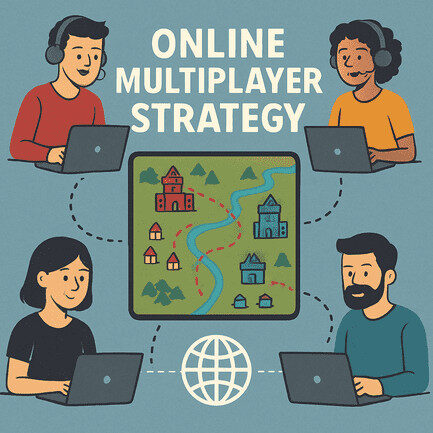In the world of gaming, there exists a concept that can significantly impact the way games are played and perceived: metagaming. This guide will explore what metagaming is, its implications in various gaming contexts, and why understanding this concept is crucial for both casual and competitive gamers. By delving into the intricacies of metagaming, players can gain insights into how games evolve and how they can adapt to enhance their gaming experience. To learn more, check out qq dewa
Metagaming refers to using information, strategies, or knowledge that goes beyond the intended rules or narrative of a game. In simpler terms, it involves making decisions based on factors outside the current game environment. This can include knowledge of game mechanics, player behavior, or even upcoming updates from developers.
The Conceptual Framework of Metagaming
At its core, metagaming involves a layer of strategic thinking that transcends the immediate game environment. Players engage in metagaming when they leverage their understanding of external elements that influence gameplay. This could range from anticipating future patches to predicting opponent strategies based on historical gameplay trends. By recognizing these external factors, players can tailor their approaches to gain a competitive edge.
The Origins of Metagaming
The term “metagaming” has its roots in tabletop role-playing games (RPGs) like Dungeons & Dragons. In these games, players often make decisions not solely based on their character’s perspective but also considering their knowledge as players. This could mean anticipating a dungeon master’s next move or using player knowledge to solve in-game puzzles. The concept has since evolved, permeating various gaming genres, yet its origins remain a touchstone for understanding its foundational principles.
Examples Across Gaming Landscapes
Metagaming manifests differently across gaming genres. In a first-person shooter, it might involve predicting enemy movements based on map knowledge. In card games, players might anticipate opponents’ hands based on card draw patterns. These examples illustrate that metagaming is not confined to a single type of game; instead, it is a versatile concept that players utilize across multiple platforms to optimize their gameplay experience.
Metagaming in Different Gaming Genres
Metagaming can be found across various gaming genres, each with unique implications and considerations. Understanding how it operates within these genres allows players to strategically navigate the gaming landscape.
Role-Playing Games (RPGs)
In RPGs, metagaming often involves players using knowledge their characters wouldn’t naturally possess. For example, knowing the weaknesses of a monster they’ve never encountered in-game or using information gained from other players outside the game to make decisions.
Character vs. Player Knowledge
A core tension in RPG metagaming is the distinction between what a character knows and what the player knows. This dichotomy can enhance or detract from the gaming experience. While utilizing player knowledge might streamline certain challenges, it can also undermine the storytelling aspect, leading to a less immersive experience for some players.
Purist vs. Pragmatist Perspectives
The debate between purists and pragmatists in RPGs centers on the value of immersion versus strategic advantage. Purists argue that maintaining character integrity enriches the narrative experience, while pragmatists advocate for strategic flexibility, leveraging every available resource to overcome challenges. Both perspectives offer valid points, highlighting the nuanced nature of metagaming in RPGs.
Enhancing Gameplay Dynamics
Despite potential drawbacks, metagaming in RPGs can enhance gameplay by encouraging more dynamic and strategic interactions. Players who effectively balance character integrity with strategic foresight can enjoy a richer, more complex gaming experience, where their decisions reflect both narrative and tactical considerations.
Online Multiplayer Games

In online multiplayer games, metagaming is prevalent as players constantly adapt to changing game environments. For instance, in games like FiveM, an online multiplayer modification framework for Grand Theft Auto V, players often use the term “meta gaming” to describe using real-world knowledge to gain an advantage in the game.
Real-World Knowledge Application
Players often apply real-world knowledge to anticipate opponent behavior, exploit game mechanics, or navigate complex environments. This application of knowledge can elevate gameplay, providing players with a competitive edge. However, it also raises ethical considerations about fair play and balance within the game world.
The Role of Community Insights
Online communities serve as a hub for exchanging metagaming strategies. Players share insights on forums, social media, and streaming platforms, contributing to a collective understanding of effective tactics. This community-driven approach fosters collaboration and innovation, as players collectively refine the meta.
Balancing Fair Play and Competitive Edge
While metagaming can enhance competitiveness, it also poses challenges for maintaining fair play. Developers and players must work together to ensure that metagaming doesn’t lead to imbalances or diminish the gaming experience for those who prefer a more straightforward approach. Striking this balance is crucial for sustaining a vibrant, engaging multiplayer ecosystem.
Competitive Gaming
In competitive gaming, metagaming is a crucial aspect of strategy development. Players and teams analyze the current “meta,” which refers to the most effective tactics available, to optimize their gameplay. This often involves studying popular strategies, understanding game patches, and anticipating opponents’ moves.
The Evolution of the Meta
The meta in competitive gaming is dynamic, shifting in response to game updates, player innovations, and evolving strategies. Players must remain agile, constantly adapting to new developments to maintain their competitive edge. This evolution challenges players to stay informed and responsive, fostering a culture of continuous learning and adaptation.
The Importance of Data Analysis
Data analysis plays a pivotal role in competitive metagaming. Players and teams analyze match statistics, opponent tendencies, and performance metrics to refine their strategies. This analytical approach enables players to identify patterns, exploit weaknesses, and optimize their gameplay, underscoring the strategic depth of competitive gaming.
Adapting to Shifting Landscapes
As the meta evolves, players must adapt their strategies to remain competitive. This adaptability requires not only understanding current trends but also anticipating future changes. Successful players balance innovation with tradition, incorporating new tactics while leveraging tried-and-true methods to navigate the ever-changing competitive landscape.
The Pros and Cons of Metagaming
Metagaming can have both positive and negative effects on the gaming experience. Evaluating these pros and cons helps players understand how to harness metagaming effectively.
Benefits of Metagaming
- Enhanced Strategy: Metagaming allows players to develop sophisticated strategies and make informed decisions, leading to a more engaging and challenging gameplay experience.
Strategic Depth and Complexity
Metagaming introduces layers of strategic depth that elevate gameplay complexity. By considering external factors, players can devise intricate strategies that challenge traditional approaches, enriching the gaming experience. This complexity encourages players to think critically, fostering problem-solving skills and strategic acumen.
- Community Engagement: Discussing and analyzing the meta fosters a sense of community among players, encouraging collaboration and knowledge sharing.
Building a Collaborative Culture
Metagaming cultivates a collaborative culture within gaming communities. Players exchange insights, share strategies, and engage in discussions that enhance collective understanding. This collaboration strengthens community bonds, creating a supportive environment where players can learn from each other and grow together.
- Skill Development: By understanding the meta, players can improve their skills and adaptability, becoming more versatile gamers.
Fostering Versatility and Adaptability
Metagaming encourages players to diversify their skill sets, enhancing their versatility and adaptability. By mastering the meta, players can navigate diverse gaming scenarios with confidence, equipped with a broad arsenal of strategies and tactics. This adaptability is essential for thriving in dynamic gaming environments.
Drawbacks of Metagaming
- Unfair Advantages: Metagaming can lead to imbalances, especially if some players exploit knowledge or tactics unavailable to others.
The Risk of Exploitation
Excessive metagaming can create disparities between players, leading to an uneven playing field. When players exploit knowledge or tactics unavailable to others, it undermines fairness and can diminish the overall gaming experience. Addressing this issue requires vigilance from both players and developers to ensure equitable gameplay.
- Reduced Immersion: In RPGs, excessive metagaming can detract from the immersive experience, as players focus more on external factors than their character’s journey.
Balancing Immersion and Strategy
Metagaming can detract from immersion, particularly in narrative-driven games where character development is central. Players who prioritize external factors over character integrity risk disconnecting from the game’s narrative. Striking a balance between immersion and strategy is crucial for maintaining an engaging gaming experience.
- Stagnation: Relying too heavily on the meta can stifle creativity, as players may become reluctant to experiment with unconventional strategies.
Encouraging Innovation and Creativity
While the meta provides a strategic framework, over-reliance can stifle creativity. Players may become hesitant to explore unconventional strategies, limiting innovation. Encouraging players to experiment and challenge the meta fosters a culture of creativity, promoting diverse approaches and fresh perspectives.
How to Approach Metagaming
Understanding and navigating metagaming requires a balanced approach. Here are some tips to consider:
Embrace the Meta
While it’s important to be aware of the meta, don’t let it dictate your entire gaming experience. Use it as a tool to inform your decisions, but also allow yourself the freedom to explore different strategies and styles of play.
Leveraging the Meta as a Guide
The meta serves as a valuable guide, offering insights into effective strategies and tactics. However, players should view it as a starting point rather than a definitive path. By using the meta as a reference, players can explore diverse strategies, enhancing their creativity and adaptability.
Balancing Meta and Personal Style
Balancing adherence to the meta with personal play style enriches the gaming experience. Players who integrate their unique preferences with strategic insights can enjoy a more personalized and fulfilling journey. This balance fosters a deeper connection to the game, encouraging players to express their individuality.
Respect the Game and Other Players
When engaging in metagaming, be mindful of the impact it may have on the game and other players. Strive for a fair and enjoyable experience for everyone involved.
Promoting Fairness and Sportsmanship
Respecting the game and fellow players is fundamental to a positive gaming experience. Players should prioritize fairness and sportsmanship, ensuring that metagaming enhances rather than detracts from gameplay. By fostering an inclusive environment, players contribute to a thriving, respectful gaming community.
Navigating Ethical Considerations
Metagaming raises ethical considerations, particularly regarding fair play and balance. Players must navigate these considerations thoughtfully, balancing competitive edge with integrity. Engaging in metagaming responsibly promotes a healthy gaming culture, where competition coexists with respect and camaraderie.
Stay Informed
Keep up with updates, patches, and community discussions to stay informed about the evolving meta. Engaging with online forums, social media, and gaming communities can provide valuable insights and perspectives.
Leveraging Community Resources
Online communities are a treasure trove of information for staying informed about the meta. Players can engage with forums, social media, and streaming platforms to access diverse perspectives and insights. This engagement enriches understanding and keeps players abreast of evolving trends and strategies.
Continuous Learning and Adaptation
Staying informed is an ongoing process that requires dedication and curiosity. Players who actively seek out new information and remain open to learning can adapt to changes in the meta with agility. This commitment to continuous learning enhances both individual and collective gaming experiences.
Conclusion
Metagaming is an integral part of the gaming landscape, influencing how games are played and perceived. By understanding its implications and adopting a balanced approach, players can enhance their gaming experience, foster community engagement, and develop their skills. Whether you’re a casual player or a competitive gamer, embracing metagaming with awareness and respect can lead to a more rewarding and enjoyable gaming journey. As games continue to evolve, so too will the strategies that define them, and metagaming will remain at the forefront of this dynamic evolution.

